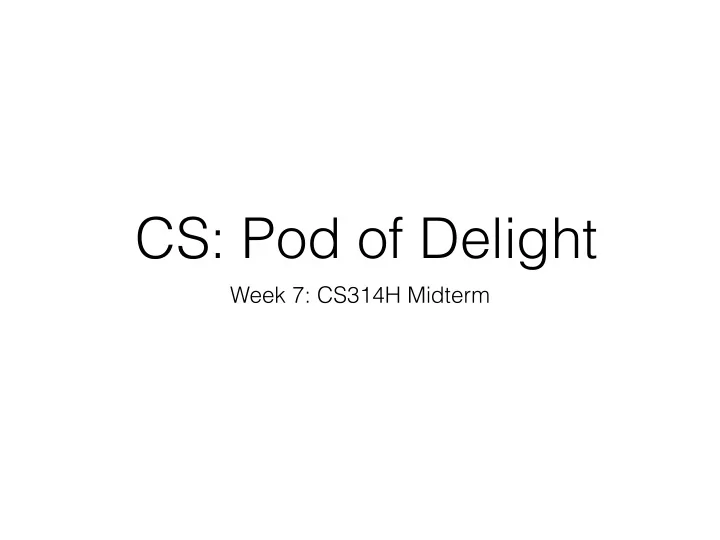

CS: Pod of Delight Week 7: CS314H Midterm
First of all
First of all • Tetris! • How is project going? • Pair programming?
Second of all • Discrete Midterm! • How did it go? • First Turing midterm
Third of all • Did you have a good weekend? • Don’t forget to have fun!
Fourth of all • Data Structures Midterm
CS314H Midterm • What to expect? • What are you learning in class?
Things to know • Be familiar with all the projects you’ve done • If you didn’t do it, at least read the karma • Understand algorithms/concepts that you used
Things to know • Data structures • HashMaps, HashTrees, Linked Lists, Binary trees, heaps, tries
Things to be familiar with • Object oriented programming • Encapsulation, inheritance, polymorphism • Interfaces, abstract classes, final, private, public • Overloading • Dynamic binding • Autoboxing • Covariance • Generics • Parametrized generics
Dynamic Binding Example • class x; class y extends x; class z extends y; • class Pub { foo(x); } • class Book extends Pub { foo(x); foo(y); foo(z); } • Pub p = new Book(); • What method gets called with: p.foo(z)? • Book.foo(x)
Interfaces, Abstract Classes • What is difference? • Interfaces are only contracts! • But can have default implementation (Java 8+) • Abstract classes can implement methods with state • Multiple inheritance • Which can be instantiated? • Neither!
Covariance Example • class Shape; class Circle extends Shape; class Square extends Shape; • Shape[] arr = new Circle[5]; • Is this legal: arr[0] = new Square(); ? • No! runtime error! arrays are covariant
Things to be familiar with • Search algorithms • Binary search, linear searching • Sorting algorithms • Quicksort, mergesort, bubble sort, insertion sort, selection sort, integer sort, radix sort • Their complexities
Data Structures and Complexities Data Structure Search Insert/Delete Array n 1 Linked List n 1/n Hash table/map 1 1 Tree logn logn BinHeap 1 (max/min) or logn logn
Algorithms and Complexities Algorithm Best Average Worst Quicksort nlogn nlogn n^2 Mergesort nlogn nlogn nlogn Bubble sort n n^2 n^2 Insertion n n^2 n^2 Selection n^2 n^2 n^2
Things to know • Complexity Analysis • Big-Oh - upper bound (grows no faster) • Big-Omega - lower bound (grows no slower) • Big-Theta - exact bound • Little-Oh - stricter upper bound (strictly slower)
Most important! • Be relaxed! • Do not overstudy, no point in memorizing everything, stressing/eating out • Get lots of sleep the night before • Think of it as a fun puzzle session :) • Ask a clarification question if something seems wrong
Good luck!
Recommend
More recommend